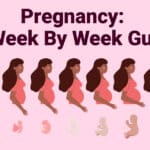Babies may not have fully developed in the womb, but that doesn’t mean that they don’t feel things. It may be a different feeling than what we experience outside of the womb, but most mothers report that babies act differently when they are hungry.
For example, one mom reported that whenever she’s hungry, her baby was more active and she could feel more kicking. Then, after eating, the baby would be more still.
This alone is a huge indicator that when mothers feel hungry, their babies in the womb are somehow affected by it. However, there are facts that indicate that just because you’re hungry, it doesn’t mean that your little one is hungry.
They are still getting all of their vitamins and nutrients. As far as we know, they do not feel hunger.
In this article
How do Babies Get What They Need in the Womb?
As babies develop in the womb, they slowly form everything from a heartbeat to a digestive system. Everything that they need in order to survive life outside of their mother. This book is wonderful if you’re interested in learning more about the development of your unborn baby.
- A Child is Born
Prices pulled from the Amazon Product Advertising API on:
Product prices and availability are accurate as of the date/time indicated and are subject to change. Any price and availability information displayed on [relevant Amazon Site(s), as applicable] at the time of purchase will apply to the purchase of this product.
The fetus is attached to the mother by an umbilical cord. (You can read a more detailed explanation of this here.) This is how the fetus receives all of their vital nutrients and vitamins that they need to grow. These are transferred from the mom to the baby.
While it makes sense that babies might not be eating if the mother is not, this is not the case. Part of the weight you gain during pregnancy is actually your body storing away important fats and other things that the baby needs.
If you go for hours without eating, your body will tap into those reserves to continue to the transfer of nutrients to your baby. One way or another, your baby winds up with everything that he or she needs.
Because of this constant flow, babies usually do not feel hungry in the womb.
When I’m Hungry is My Baby Hungry Too?
Most pregnant women assume that the fetus feels hungry because the little one will kick like crazy when they have not eaten yet. Then, after eating, there is a period of calm.
View in gallery
While it makes sense that this would be because the baby is hungry, it is not. Often, this is caused by a drop in blood sugar.
When you experience a drop in blood sugar, the baby actually has less energy. It’s believed that kicking is a response to the drop that they are experiencing.
Baby Kicking After Meal Times
After meal times is a common time for babies to kick as well. While this may be understood as the baby being happy, it is because of the increase in blood sugar and nutrients. This gives your little one more energy to move around.
The end result of this is that they will kick and move around more. It is their reaction to suddenly having more sugar. Likewise, babies are known to kick more after a pregnant mom eats a lot of sweets.
Babies Do Not Kick Because They Are Doing Without
Most pregnant women are concerned that their babies kicked when they feel hungry is because their little one is not getting enough nutrients, but this is more than likely not the case.
Babies are like little parasites. They will take whatever they need from the body, whether it be calcium, iron, or other important vitamins. The baby gets whatever it needs first. Then, the mother gets whatever is left.
Because of this, the mother will be the one that is lacking vitamins and nutrients if there is not enough to go around, not the baby.
Malnourishment Causes A Decrease In Fetal Movement
Studies have revealed quite a few things about malnourishment, and the effect it has on an unborn fetus. According to this article, mothers that are malnourished before they are pregnant are more likely to be malnourished during their pregnancy. This often results in less movement.
If mothers continue to be malnourished throughout the pregnancy, it can result in mental retardation in newborn babies and babies being underweight when they are born.
Given this research, mothers can rest assured that their baby is not kicked because they are slowly starving. Instead, it’s important to watch for signs of a decrease in movement if you’re concerned that your unborn baby is not getting enough to eat.
When To Be Concerned
Most mothers-to-be are always advised to pay attention to the fetal movement because this sets the standard for normal movement.
The sudden increase in movement before mealtime does signal a change, but it is often not a reason to be concerned if it happens regularly before mealtimes. In this situation, the increase in fetal movement is normal.
However, if this is not normal for your baby, it is important to note. Any drastic increase in activity or what you would consider frantic fetal movement should be discussed with your obstetrician to make sure that your baby is okay.
It should be noted that fetal distress is often associated with a decrease in fetal movement, though.
If you notice that your baby is kicking less than they normally do, this is a sign that you should call your obstetrician about. This could be that your baby is simply getting bigger and has less room to move around.
It could also be a sign that something is wrong with your little one. It’s always a good idea to be safe instead of sorry when it comes to how often your baby is moving and when to call the doctor.
Make Sure You Get Plenty To Eat
It can be difficult for some soon-to-be moms to keep up with the higher calorie intake. Those that previously suffered from eating disorders might not feel hunger as often as they should, resulting in them eating very little.
Most pregnant women need between 1800-2400 calories a day.
This article gives a guideline per trimester. If you have a hard time determining whether you’re getting enough to eat, counting calories can help make sure that you’re healthy and that your little one is getting everything that they need.
Whether babies feel the pain of hunger like we do is still unknown. Babies have been seen crying in their ultrasounds, and some fetuses respond to certain noises by crying, complete with the lip quiver.
If babies can react to that in the womb, it makes sense that they would react to hunger. However, it’s highly unlikely given the way that the body is designed to constantly feed the unborn fetus.
Even if babies are capable of feeling hunger, they probably aren’t. Instead, they’ll take the nutrients and fat stores in your body, resulting in you feeling hungry.






